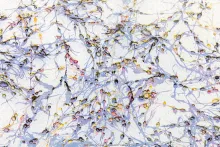A multi-million pound programme of strategic research delivered over five years providing science and evidence to support policymakers and its partners. Informed by strong partnerships and the needs of a broad range of stakeholders. Science at the heart of society contributing to the health, wealth and wellbeing of Scotland and beyond.
Ongoing research (2022-2027)
Realising change: working with communities to inform a resilient recovery process in remote, rural and island communities
This project seeks to both understand and facilitate change in remote, rural and island communities working with stakeholders at local, regional and national levels using a combination of qualitative, quantitative and modelling approaches.
Reciprocal care for nature and wellbeing
This project explores how the capacity to engage with and care for nature can be cultivated. We consider environmental settings, users, mechanisms for benefit (green prescribing, outdoor learning) and investment.

Reimagined policy futures: Shaping sustainable, inclusive and just rural and island communities in Scotland
This project combines large-scale citizen science through a new Rural Exchange, secondary data analysis, in-depth qualitative work with stakeholders and rural and island communities, policy reviews, and international learning. The project provides recommendations for new and re-designed policy interventions to ensure sustainable, inclusive and just futures for rural and island communities.
Research into zoonoses and emerging diseases to protect public health and animal health in Scotland
This project is focusing on understanding the risk of emerging vector-borne zoonoses that could affect human and animal health in Scotland and improving our understanding of the transmission of two bacteria which cause food-borne zoonoses in Scotland. Data generated in this project is informing control strategies and is providing mitigation which could break transmission chains, improve animal welfare and production, and save human life.
Revalorisation potential of agricultural waste materials into a sustainable source of health-promoting dietary fibre
Fibre is an important part of a healthy diet, as it is fermented by gut microbes to health-promoting compounds. We investigate whether agricultural and food-processing waste materials can be modified to increase their fermentability by gut microbes,. The aim is to explore whether food production waste materials can be developed into a novel source of fibre, thus improving the sustainability of agricultural practice. This not only contributes to reducing the environmental impact of Scotland’s food and drink sector, but will also identifies opportunities for innovation in the Scottish food and drink sector and expands on effective pathways to increase fibre in the Scottish diet.
Risk-benefit analysis of Scottish seaweeds as a sustainable food source
The project aims to test the evidence that Scottish seaweeds can provide rich, sustainable, plant-based sources of essential dietary micronutrients with an eventual goal to include these as dietary ingredients within foods. A key driver for this research is the need to provide alternative, sustainable sources of micronutrients which will decrease as practices transform to address the climate emergency and the need to achieve Net Zero. This project will determine levels of micronutrients as well heavy metals within selected Scottish seaweed species, and therefore aims to identify seaweed species with low levels of heavy metals but dietary-relevant levels of micronutrients which could be used to provide a sustainable, plant-based source of these micronutrients.

Role of transmission and pathogen components in virulence and disease pathogenesis for important endemic diseases of livestock in Scotland
Investigation of how pathogens responsible for key welfare and production-limiting diseases of Scottish livestock are transmitted to their host animal, determining the key pathogens that are important for infection and disease, and how they interact with the host immune system.
Scotland’s biodiversity: people, data and monitoring
This project addresses deficiencies in data and recording infrastructure of Scottish biodiversity enabling improved identification of drivers, hotspots and uniqueness.
Scotland’s Land Reform Futures
The Scotland’s Land Reform Futures project supports Scottish Government policy development regarding community land ownership and engagement in land use decision-making, and increases our understanding of roles of land ownership and land reform in achieving net zero emissions and reversing biodiversity decline. It advances social theory on community empowerment, social justice, and the potential for progressive property rights in Scotland.
Seeking multiple benefits from natural carbon stores in the uplands
This project explores the relationship between carbon storage, biodiversity conservation and flood mitigation in upland habitats to detect synergies and trade-offs and identifies land management practices that optimise the benefits to be gained. It is generating evidence to inform land-use management practices in the Scottish uplands that contributes to tackling the twin challenges of biodiversity loss and the climate emergency.